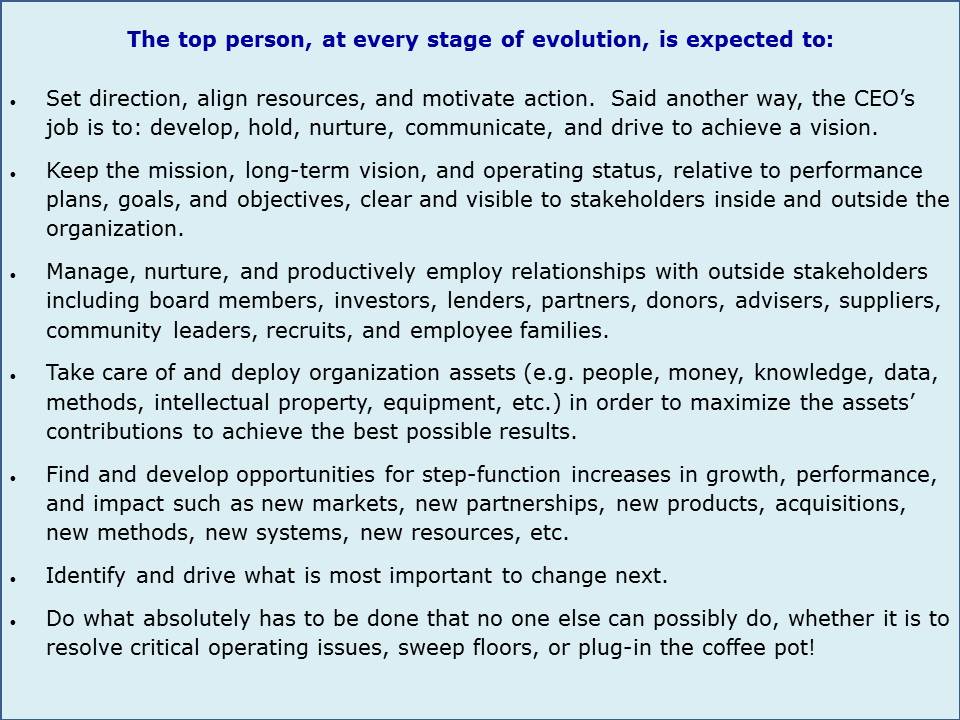Chief executive officers, managing directors, executive directors, and chief administrators subscribe to intelliven.com for content, cases, and tools to help organizations they lead perform and grow to their full potential. Leaders of any organization, no matter how large or small, those who aspire to be leaders, and those who help and support leaders all find the site full of valuable content, examples, and templates to help in extraordinary, as well as every day, situations.
The leader’s work is never done. Leadership is 24/7 and comes with a ubiquitous, omnipresent, and incessant sense of accountability to owners, investors, lenders, donors, customers, tax-payers, partners, employees and their families, and the local community. The mantel of responsibility is never unyoked, which may cause physical distress to those not cut out for the role, or the equivalent of a runner’s high to those who are!

The leader’s role and specific tasks vary considerably with maturity and scale, but the responsibilities listed above are core from beginning to end. Despite this clarity, deciding how to spend time hour-by-hour, day-to-day is far from clear for many if not most.
Specifically, many wrestle with whether to do work themselves or to assign and develop others to perform the functions of their organization in an ever-more systematic, teachable, scalable, predictable, and reliable way. As Michael Gerber puts it in The E-myth Revisited, it comes down to whether the one in charge wants to “make pizza” or “build a pizza-making business.”
When a leader decides to do personally what s/he believes is needed to get work done, no matter how right it seems at the time, s/he should consider the following, all of which can lead to less than optimal results:
- Time spent on a specific task is time that cannot be spent on a task that may be even more important.
- Everyone else in the organization will refrain from doing what their leader does for fear of upstaging or competing; their baseline assumption is that if the leader is doing it, they must not need to.
- Others in an organization tend to assume that what the leader does is right and correct, so they fail to think critically about it and do not push back when they should.
The net effect is that the most important thing for the top-person to do does not get done, s/he ends up doing what others can and should do but now avoid doing, and there is a lack of critical thinking which can lead to poor performance. The organization becomes constrained by its leader in terms of its ability to perform and grow.
The leader in this circumstance might wonder if s/he should work on being a better manager, or work on being a better leader. The best figure out that it is not all about them. It is about their organization and the decision to either manage or lead is a false dichotomy.
The simple truth is that the one in charge needs to manage in order to lead and, indeed, can and should manage to lead his/her organization to achieve planned performance and growth. The top person’s first job is to manage her/him-self to lead.
It is much like going from jungle soccer, where every player runs to the ball, to position play where the coach has assigned specific roles and responsibilities to each player. Similarly, instead of 20 people helping the leader, the leader helps 20 people to excel at the job s/he has assigned each to do.
IntelliVen content is for current and aspiring leaders who want to build “pizza-making businesses.” The topics covered here are not from your parents’ textbook or an MBA lecture. What distinguishes IntelliVen content is that it offers a chance to learn from those who have grown wiser from being in the trenches and who see every mistake and success as yet another opportunity to learn and to grow.
IntelliVen principals have managed to lead in many different businesses and situations. They have paid attention to what worked and what did not work, and why. They have consolidated lessons-learned and tested and tuned key insights that have led to the discovery of some relatively simple, but also hidden, truths about organizations and leaders that, once understood, can help those interested manage to be effective leaders.
The truths shared in IntelliVen posts, tools, insights, and videos can change the odds for success in simple yet powerful ways. Current and aspiring leaders, and those who help and support leaders, are invited to subscribe, read, contemplate, dialogue, develop their own points of view, and ultimately manage to incorporate what makes sense into their own approach to leadership, both now and as their careers unfold.

